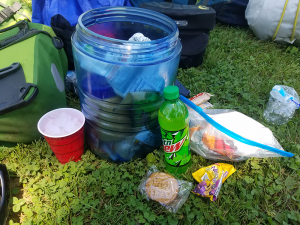Letter 4
 For a cyclist, the land has a rhythm. Many factors define this rhythm; the cycle of going up and down hills, the presence of trees or direct (sometimes scorching) sun, and the alternation between storms, drizzle, and sunshine all contribute to the experience of a cyclist and, especially, define gear shifts, pacing, and the application of simple tricks to keep up spirits and motivation. The rhythm of West Virginia roads became very natural to me. The mountains and hills required much focus and persistence on the ascent, but I could always keep in mind that I would eventually have a long, sometimes steep downhill as a reward.
For a cyclist, the land has a rhythm. Many factors define this rhythm; the cycle of going up and down hills, the presence of trees or direct (sometimes scorching) sun, and the alternation between storms, drizzle, and sunshine all contribute to the experience of a cyclist and, especially, define gear shifts, pacing, and the application of simple tricks to keep up spirits and motivation. The rhythm of West Virginia roads became very natural to me. The mountains and hills required much focus and persistence on the ascent, but I could always keep in mind that I would eventually have a long, sometimes steep downhill as a reward.
So, there was a cycle of psyching myself up to push upwards, then enjoying the fleeting sprint down, over and over. This became normal to me–predictable in a way that didn’t make the ride physically easier, but lifted some of the mental burden of motivation, allowing me to sync my riding rhythm with that of the land. But, this rhythm has changed as I have travelled further, and, as I found myself heading further west in Kentucky, I was challenged to adjust.
Kentucky was in a lot of ways disorienting. Whereas I had been used to steep hills and valleys, the roads in Eastern Kentucky seemed to follow narrow seams on top of ridgelines, providing for a stimulating aesthetic but a rhythm of a higher tempo than I was used to. Moreover, in West Virginia, I had some familiarity with almost every road, even if it was a just a vague awareness of its location with respect to some other road on which I had travelled. But, here in Kentucky, I had no reference points–I was covering new ground.
In addition to the change in terrain, I realized that this would be my first time west of the Appalachians for an extended period of time in a long time. While not a strict barrier per se, this was an important psychological threshold to pass on the trip, the point when the trip turned from a jaunt in the backyard to something more. All of these physical changes required a mental change to stamina and approach, which I came to develop as I went.
But, beyond this physical sense of distortion, I faced a much stronger challenge to which I had to acclimate. In Kentucky, I quickly realized my place as an outsider. The realization was both internal and external, one that I created in my own mind from a feeling of leaving my home-territory, and one I felt from those around me. While in West Virginia I could have easily been considered as native, from my knowledge of the area to my accent, in Kentucky there was no confusion, beginning with the accent. On Duke’s campus, we have such a diverse population that this Southern feature can be obscured, but on the road in Kentucky, in Walmarts, Subways, and at gas stations–all places frequented almost exclusively by locals–it was clear to me and to others that I was different, anytime I opened my mouth.
There was one particular afternoon, when I was holed up in a Walmart entryway in Lebanon, KY as a thunderstorm raged outside, that I endured the curious gazes of many. Some were skeptical of me and my strange appearance, on a bike and in my gear, while many too were sympathetic, jokingly lamenting the rain. From all, though, I could sense a curiosity that at times made me feel uncomfortably in the limelight.
These feelings all contributed to a sense of disorientation that, by the time I left Kentucky, had all but disappeared. This comfort arose not from within, but from the very same people to whom I seemed so strange. In a way that left me in awe in the moment and fascinated long after, Kentuckians showed me kindness that was as distinctly foreign to me as I was to them.
At one campground, a lady had heard from a staff member that I was biking across the country. So, as I sat journaling, she rolled up to me in her truck and stepped out holding a Ziploc bag containing assorted cookies, Cheetos, sausage, and other snacks; a bottle of Mountain Dew; and ice in a solo cup. Stunning me, she handed me all three, saying it was a gift and that she heard what I was doing and wanted to support me. I was so grateful to her, understanding how much she went out of her way to prepare such a gift.
But, also flashing in my mind was the nutritional value of what she had given me–undoubtedly not the preferred fuel for a biker about to travel 70 miles. I was conflicted, but quickly made my decision. As I sat back down, I cracked open the bottle and poured some soda into the cup, and enjoyed its bubbling as it ran down my throat. I ate the cookies, and I was grateful that someone had been so kind–and that sweet-tasting soda doesn’t get lost in cultural translation.
